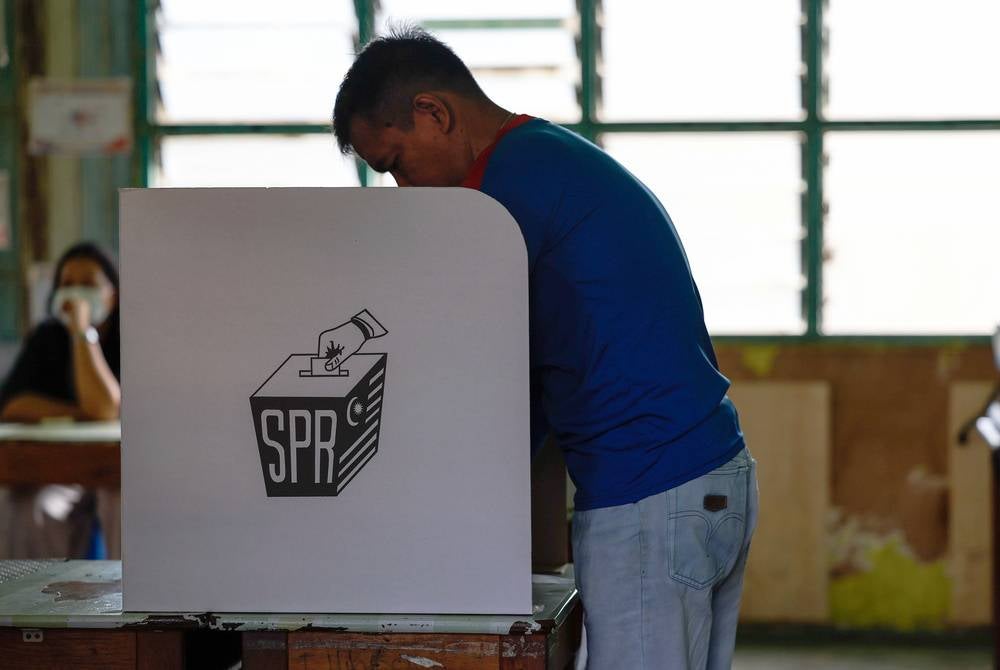A choice between two evils: Political parties' candidate selection limits voters' choice
Malaysian voters had long complained about how every general election, they were only choosing the less unpleasant between two choices as there were limited candidate options presented by political parties.

SHAH ALAM – In the complex web of Malaysian politics, the burden of electing unreliable politicians and representatives falls not solely on political parties or the electorate but rather on the intertwined relationship between them.
Malaysian voters had long complained about how every general election, they were only choosing the less unpleasant between two choices as there were limited candidate options presented by political parties – making decision-making more challenging.
To better understand this issue, political experts and analysts provided diverse perspectives and thoughts, shedding light on the complexities of the matter.
When asked if it was the Malaysian voters’ fault that the country had Members of Parliament who were deemed unreliable, O2 Malaysia head researcher Anis Anwar Suhaimi said that electing unreliable politicians was a complex issue in democracies as leaders reflect constituent values.
“Avoiding a simplistic ‘blame game’, responsibility partly lies with parties for candidate selection, limiting voter choices.
“Voters are typically limited to choosing among the presented candidates, which can sometimes feel like a choice between ‘two evils.
“Voter expectations vary across segments, influencing representative choices. This complexity highlights the shared responsibility between parties and voters in addressing unreliable political representation,” he said.
Anis said that that in a democratic society, combating the influence of unreliable politicians requires broadening views and reducing partisan biases.
“Recognising personal biases is key, as they may obscure the positive aspects of differing perspectives. Moving beyond strong partisanship allows for a balanced view of politics.
“An open-minded approach involves listening to diverse viewpoints firsthand and critically evaluating ideas from all parties to make informed decisions.
“By cross-checking information and directly engaging with opposing opinions, voters can better identify unreliable politicians and choose leaders in the community's best interest,” he added.
Anis also said in Malaysia, societal values and cultural norms strongly influenced the acceptance of unreliable politicians, shaped by cultural diversity, community loyalty, historical legacy, media influence and political awareness levels.
“Community ties and loyalty often prioritise communal representation over concerns about reliability, while historical narratives and media polarisation normalise certain political behaviours.
“Varying levels of political literacy contribute to differing acceptance levels across segments of society, highlighting the multifaceted nature of the issue and the need for a comprehensive understanding to drive transformative change,” he explained.
Echoing Anis’s view, National Professors Council Senior Fellow Datuk Dr Jeniri Amir said that political parties typically nominate candidates for elections and if a poorly performing politician was selected, it reflected on the party's leadership and selection process, possibly involving issues like nepotism or prioritising electability over competence.
“Alternatively, voters bear responsibility for choosing and voting for representatives, so if they elect underperforming politicians, it may result from misinformation or errors in judgment.
“Biased reporting by the media can also influence voter perceptions, potentially leading to ineffective representation if candidates' backgrounds are inaccurately portrayed,” he explained.
Jeniri emphasised that voters should thoroughly research candidates' backgrounds, experiences, performances, and political knowledge using reliable news sources to make informed decisions.
He also stressed that voters should not be swayed by speeches, campaigns or rhetoric, and should critically evaluate candidates' statements, avoiding those who resort to fearmongering or abusive rhetoric.
“Improving political socialisation and education is crucial to ensure voters understand the basic principles of democracy.
“In such societies, communities, or among voters who prioritise authority, there's a tendency to accept unreliable politicians merely based on their positions of power, often disregarding or justifying their shortcomings.
“Cultural identity and ideological beliefs further influence perceptions and acceptance of politicians, sometimes leading to support for those who align with these factors regardless of their actual performance,” he added.
Concurring with the opinions of Anis and Jeniri, Academy of Nusantara Strategic Research (NASR) Senior Fellow Professor Dr Azmi Hassan said that both the party and the people share responsibility in this matter.
“If the party is aware of a candidate's unreliability, they should refrain from nominating them. Likewise, if voters recognise a candidate's lack of reliability, they should refrain from supporting them at the polls.
“The challenge lies in the fact that politicians, particularly such candidates, excel in persuasion. They are adept at making promises and presenting themselves convincingly, making it challenging to resist their appeal.
“Often, these candidates belong to the specific demographic they are trying to win over, adding to the difficulty unless there is a glaring and undeniable demonstration of their untrustworthiness and unreliability,” he said.











